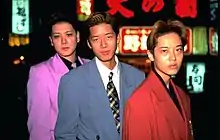Shinjuku Boys
Shinjuku Boys is a 1995 film by Kim Longinotto and Jano Williams. It explores the lives of three non-binary or transgender men who work at the New Marilyn Club in Tokyo, Japan. The term they use for themselves is onabe, and the three protagonists discuss their romantic relationships, their relationships with their parents, their gender presentations, how they understand their own genders, and their different outlooks on life.
| Shinjuku Boys | |
|---|---|
 The Shinjuku Boys: Kazuki, Tatsu, Gaish | |
| Directed by | Jano Williams, Kim Longinotto |
| Produced by | Kim Longinotto |
| Starring | Gaish Kazuki Tatsu |
| Cinematography | Kim Longinotto |
| Edited by | John Mister |
| Music by | Nigel Hawks |
| Distributed by | Second Run DVD |
Release date |
|
Running time | 53 minutes |
| Country | United Kingdom |
| Languages | English, Japanese, subtitled |
Reception
In 1995, Shinjuku Boys won Outstanding Documentary at the San Francisco Gay and Lesbian Film Festival,[1] a Silver Hugo Prize at the Chicago International Film Festival[2] and Gold Prize at Houston Film Festival.[3] The film received positive reviews following its 2010 release by Second Run DVD. In a review at DVDTalk, Chris Neilson praised the films directors, commenting that "Through low-key cinéma vérité filmmaking, Longinotto and Williams provide insight into the professional and personal lives of the trio of onnabe [sic]".[4] Sarah Cronin of Electric Sheep Magazine also notes that "Despite the fact that it's a cruder, more dated film, it's the strength of the interviews in Shinjuku Boys that makes it an even more arresting documentary."[5]
See also
- Shinjuku Ni-chōme, an LGBT bar district in Tokyo
References
- "Kim Longinotto". Women Make Movies. Retrieved 22 June 2011.
- "Shinjuku Boys". Second Run DVD. Retrieved 22 June 2011.
- "1996 Winners". WorldFest-Houston International Film Festival. Archived from the original on 28 September 2011. Retrieved 22 June 2011.
- Neilson, Chris (31 March 2010). "Gaea Girls / Shinjuku Boys". DVDTalk. Retrieved 22 June 2011.
- Cronin, Sarah (1 February 2010). "Gaea Girls + Shinjuku Boys". Electric Sheep Magazine. Retrieved 22 June 2011.